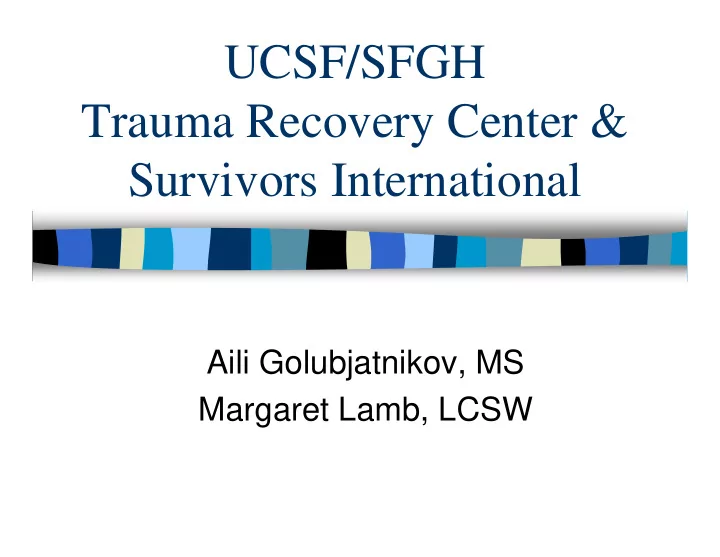

UCSF/SFGH Trauma Recovery Center & Survivors International Aili Golubjatnikov, MS Margaret Lamb, LCSW
TRC Mission Serving those in our community who have suffered from trauma, violence, and loss, we are dedicated to promoting healing by providing respectful, compassionate, and effective mental health and medical services.
TRC Goals To offer early intervention for adult victims of interpersonal violence To engage victims who might have difficulty accessing more traditional mental health services
Survivors International at the Trauma Recovery Center
Survivors International provides essential psychological, social service and medical services to help heal the wounds of torture for those who have survived persecution and have fled to the United States seeking safety and freedom. Our program aims to help survivors re-establish healthy, productive lives by providing support and ensuring access to comprehensive services. Survivors International serves residents of San Francisco, and our services are available to survivors regardless of where they are in the immigration process.
Survivors International Services Individual psychotherapy for adults Forensic psychological and medical evaluations for asylum applicants Psychiatric medication management Clinical support groups Speaker’s Bureau Medical consultation and referrals for primary care Links to local agencies that provide assistance for food, shelter, education, and employment
SI Services, Cont. One-on-one support with day-to-day living needs and accompaniment to appointments Ongoing case management to ensure that each survivor gets what he/she needs to heal and thrive Tutoring available (financial literacy, computer literacy, post-asylum benefits, English language and literacy) Free clothing closet for clients, with professional and everyday clothing, and personal hygiene supplies
Psychotherapy Support Psychoeducation Skill Training (Relaxation, Containment) Reprocessing Trauma (when appropriate) Goals: to integrate the trauma into the person’s life and help them return to prior level of functioning (or higher)
Common Treatment Strategies Relaxation training Exploration/practice of healthy coping skills Cognitive Behavioral Therapy (targeting common post-trauma thoughts: negative self-talk, blaming, rumination, etc.)
Common Treatment Strategies Cognitive Processing Therapy – focuses on meaning of the trauma, its effects on self-esteem, intimacy, trust, sense of safety, etc.) Narrative Therapy Art Therapy Exposure Therapy
Case Management Housing Medical Care (Primary and Specialty Care) Financial Entitlements (SSI,Medi-Cal, etc.) Collaborative work with immigration attorney Referrals for other services (acupuncture, massage, substance abuse treatment) Community Connections
Groups for TRC/SI clients: Waitlist Group (psychoeducation/coping) Managing Anxiety Seeking Safety Parents of Homicide Victims DFSA CHATT – Speakers Bureau Quarterly SI Tea (community event, not therapy group)
Special Considerations for Torture Survivors CULTURE SHAME DISTRUST
Engagement, Outreach and Tracking Many survivors feel ashamed about entering therapy and/or avoid trauma reminders Cultural barriers/mental health stigma We work with clients on what is most important to them first until rapport is built We will see clients at the hospital, at their home, or in their community when necessary Clients must give advance permission to be tracked
SI Staff 2 clinical social workers, 1 psychologist, and 2 part-time psychiatrists 2 Project Assistants 10 TRC clinicians who have some SI clients on their caseloads Currently services in Spanish, Portuguese, Italian, and Vietnamese (and access to interpreters for a wide- range of other languages)
Eligibility for SI Mental Health Services Must be an adult survivor of torture (see torture definition) or adult secondary survivor of torture who is experiencing mental health symptoms related to the trauma(s) Must be a San Francisco resident Must not have another mental health provider (therapist, psychiatrist, or master’s level case manager) currently No private insurance (Medi-Cal, HSF, Medicare okay).
U.S. Definition of Torture Torture Victims Relief Act (1988) “Torture” means an act committed by a person acting under the color of law specifically intended to inflict severe physical or mental pain or suffering upon another person within his custody or physical control.
Points of Referral SFGH Refugee Clinic Newcomers Health Program SFGH Behavioral Health Team Community Agencies Immigration Attorneys Self-referral
Referrals to Survivors International To make a referral for mental health services: Call TRC/SI and ask for the “Building Officer of the Day,” M-F, 8-5pm, Tues 8-7pm If eligible, the Building Officer of the Day will be able to schedule an intake interview (the first step to entering services)
Referrals to Survivors International To make a referral for a psychological or medical evaluation: Contact Cristina Biasetto, 415-437-3049 cristina.biasetto@sfdph.org Documents needed before an eval can be scheduled: http://traumarecoverycenter.org/services/surviv ors-international/asylum-documentation/
How to reach us: UCSF/SFGH Trauma Recovery Ctr. Survivors International 2727 Mariposa (at Bryant), Suite 100 San Francisco, CA 94110 415-437-3000 (front desk) 415-437-3050 (fax) www.traumarecoverycenter.org
Questions? Feedback? Thank you!
Recommend
More recommend